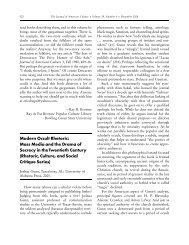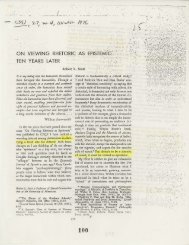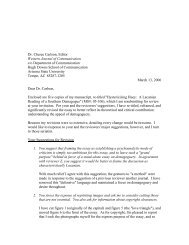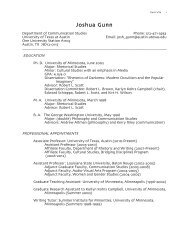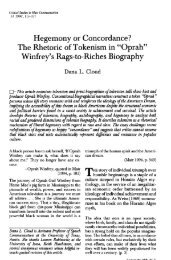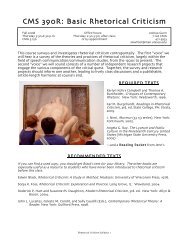The Rhetoric and Death of U.S. Freemasonry In this essay I argue ...
The Rhetoric and Death of U.S. Freemasonry In this essay I argue ...
The Rhetoric and Death of U.S. Freemasonry In this essay I argue ...
You also want an ePaper? Increase the reach of your titles
YUMPU automatically turns print PDFs into web optimized ePapers that Google loves.
<strong>Death</strong> <strong>of</strong> <strong>Freemasonry</strong> 35<br />
equality outside the state. <strong>The</strong> coming together <strong>of</strong> people into a public<br />
was therefore anticipated in secret, as a public sphere existing largely<br />
behind closed doors. 79<br />
And it was behind the lodge doors, guarded with passwords <strong>and</strong> h<strong>and</strong>shakes, that the<br />
"rational faculty" was protected from the counter-secret machinations <strong>and</strong> "chanceries<br />
<strong>of</strong> the prince." 80<br />
For both the state <strong>and</strong> the lodge, Habermas <strong>argue</strong>s, publicity had to<br />
"rely on secrecy" until methods <strong>of</strong> rational deliberation <strong>and</strong> judgment in private helped<br />
to topple the secrecy <strong>of</strong> the state in dem<strong>and</strong>s for transparency. Nevertheless, the<br />
unforeseen consequence Masonry's promotion <strong>of</strong> democracy <strong>and</strong> social equality,<br />
suggests Habermas, is that the fraternity "fell pray to its own ideology" as other publics<br />
began to dem<strong>and</strong> transparency for counterpublics <strong>of</strong> all sorts, which is precisely what<br />
the U.S. Anti-Masonic movement illustrates. 81<br />
<strong>The</strong> decline <strong>of</strong> <strong>Freemasonry</strong> is<br />
paradoxically symptomatic <strong>of</strong> the realization <strong>of</strong> republican ideals.<br />
Coupled with Putnam's technological explanation for the decline in civic<br />
enjoyment in the United States, Habermas' analysis would support the argument I have<br />
advanced in <strong>this</strong> <strong>essay</strong>: <strong>Freemasonry</strong> is on the decline because it has no secrets <strong>and</strong><br />
because its leaders do not seem to morn the loss <strong>of</strong> the drama <strong>and</strong> inspiration <strong>of</strong><br />
mystery so central to its tradition. Furthermore, if the formation <strong>of</strong> a given public is<br />
discerned rhetorically at the sites <strong>of</strong> discrimination, if, as Jodi Dean <strong>argue</strong>s, the<br />
constitutive limit <strong>of</strong> publicity is the site <strong>of</strong> secrecy, then the true public <strong>of</strong> Masonry has<br />
shifted to the popular imaginary <strong>of</strong> enter/infotainment. 82<br />
This would imply, <strong>of</strong> course,<br />
that the drama <strong>of</strong> secrecy on the page <strong>and</strong> screen has analogously become the scene<br />
<strong>of</strong> spiritual insight as much as it has become the locus <strong>of</strong> public debate (or rather, the<br />
place where talking heads debate for us so that we are relieved <strong>of</strong> the burden). 83<br />
<strong>In</strong>s<strong>of</strong>ar as Masonic leaders are "giving it up" in the hip-hop argot <strong>of</strong> contemporary



